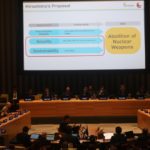(3) Treaty on the Prohibition of Nuclear Weapons (TPNW)
The number of countries signing and/or ratifying the TPNW which was adopted on September 20, 2017, has steadily increased. As of the end of 2020, 51 countries have ratified (c.f., 34 countries in 2019) among the 86 signatories (80 countries in 2019). Among the countries surveyed, those that have ratified are Austria, Kazakhstan, Mexico, New Zealand, Nigeria and South Africa, and those that have only signed are Brazil, Chile, Indonesia and the Philippines.
As the number of ratifying countries reached 50 on October 24, 2020, the TPNW entered into force on January 22, 2021, in accordance with Article 15 of the treaty. Stéphane Dujarric, spokesman for UN Secretary-General António Guterres, stated that its entry into force is “the culmination of a worldwide movement to draw attention to the catastrophic humanitarian consequences of any use of nuclear weapons. It represents a meaningful commitment towards the total elimination of nuclear weapons, which remains the highest disarmament priority of the United Nations.”45 According to the treaty, the first Conference of the States Parties to the TPNW is to be held within one year of the treaty’s entry into force.
At the 2020 UNGA First Committee which was held prior to the confirmation of the treaty’s entry into force, many of the treaty’s proponents argued for the importance of the TPNW and the need for more countries to sign and ratify it. For instance, Austria stated:
By adopting and now signing and ratifying this treaty, states are sending a clear message that nuclear weapons represent an existential threat to humanity and that only their total elimination can bring security. There is no alternative in order to prevent the catastrophic humanitarian consequences that would result from any nuclear explosion, be it intentional, by accident or as a product of miscalculation. The TPNW strengthens the NPT and the norm against the use of nuclear weapons. The Secretary General rightly calls the treaty ‘a further pillar of the disarmament regime.’ … Its entry into force is now imminent and Austria looks forward to the first Meeting of States Parties at the United Nations in Vienna.”46
South Africa also said, “The [TPNW] is an historic milestone for nuclear disarmament in that it shares with the NPT the core goal of the abolition of nuclear weapons. As we stated before, the two Treaties are fully compatible and indeed complimentary.”47
Key goals of the TPNW’s proponents include the signing of the treaty by NNWS which are allied with nucleararmed states and are thusly provided with extended nuclear deterrence. In September 2020, 56 former high-ranking officials of such NNWS—including presidents, prime ministers and foreign ministers—and former NATO Secretaries-General released an open letter, coordinated by the International Campaign to Abolish Nuclear Weapons (ICAN). It stated, “All responsible leaders must act now to ensure that the horrors of 1945 are never repeated. …Sooner or later, our luck will run out—unless we act. The nuclear weapon ban treaty provides the foundation for a more secure world, free from this ultimate menace.”48
On the other hand, nuclear-armed states maintained their position of refusing to sign the TPNW. Furthermore, in October 2020, it was reported that the United States sent letters to the TPNW ratifiers arguing, “Although we recognize your sovereign right to ratify or accede to the [TPNW], we believe that you have made a strategic error and should withdraw your instrument of ratification or accession.”49
U.S. treaty allies, including Japan and NATO countries, have also made it clear once again that they will not sign the treaty. In the meantime, the Belgian new coalition government which inaugurated in October 2020 states in its government declaration concluded by seven parties, “Belgium will play a proactive role in the 2021 NPT Review Conference and, together with European NATO allies, will explore how to strengthen the multilateral non-proliferation framework and how the [TPNW] can give new impetus to multilateral nuclear disarmament.”50 The coalition government includes parties which support the TPNW; therefore, they agreed on the TPNW as described above. However, it does not seem to imply that Belgium would take any involvement, especially that of signing the treaty. In December, the NATO member states released a statement, in which they stated, “[W]e collectively reiterate our opposition to this treaty, as it does not reflect the increasingly challenging international security environment and is at odds with the existing nonproliferation and disarmament architecture.”51
Meanwhile, Sweden—which joined the adoption of the TPNW in July 2017 but announced in January 2019 that it had made a decision not to sign the treaty in its present form, because of the potential impact on its strategic relationship with NATO52—stated at the 2020 UNGA First Committee that it had not changed its stance regarding signing the treaty, but that it would “seek to become an observer state once the treaty enters into
force.”53
Regarding alliance or alignment with nuclear-armed states, Austria and Ireland indicated that signing and ratifying the TPNW “represents no impediment to membership or association with NATO through alignment with Partnership for Peace as long as signatories remain aloof from planning or operational matters involving nuclear weapons.”54
As was the previous years, at the 2020 UNGA, a resolution was adopted titled “Treaty on the Prohibition of Nuclear Weapons,” which called for signing and ratifying the treaty.55 The voting behavior of countries surveyed in this project on this resolution was as follows.
➢ Proposing: Austria, Brazil, Chile, Indonesia, Kazakhstan, Mexico, New Zealand, Nigeria, the Philippines, South Africa and others
➢ 130 in favor (Austria, Brazil, Chile, Egypt, Indonesia, Iran, Kazakhstan, Mexico, New Zealand, Nigeria, the Philippines, Saudi Arabia, South Africa, the UAE and others); 42 against (Australia, Belgium, Canada, China, France, Germany, India, Israel, Japan, South Korea, North Korea, the Netherlands, Norway, Pakistan, Poland, Russia, Turkey, the United Kingdom, the United States and others); 14 abstentions (Sweden, Switzerland and others) – Syria did not vote.
Regarding a legal prohibition of nuclear weapons, the UNGA in 2020 adopted resolutions “Follow-up to the advisory opinion of the International Court of Justice on the legality of the threat or use of nuclear weapons”56 and “Convention on the prohibition of the use of nuclear weapons.”57 Their voting behaviors of respective countries with respect to these resolutions are as follows:
➢ “Follow-up to the advisory opinion of the International Court of Justice on the legality of the threat or use of nuclear weapons”
◇ Proposing: Egypt, the Philippines and others
◇ 136 in favor (Austria, Brazil, Chile, China, Egypt, Indonesia, Iran, Kazakhstan, Mexico, New Zealand, Nigeria, Pakistan, the Philippines, Saudi Arabia, South Africa, Sweden, Switzerland, Syria, the UAE and others); 33 against (Australia, Belgium, France, Germany, Israel, South Korea, the Netherlands, Norway, Poland, Russia, Turkey, the United Kingdom, the United States and others); 15 abstentions (Canada, India, Japan, North Korea and others)
➢ “Convention on the prohibition of the use of nuclear weapons”
◇ Proposing: India and others
◇ 120 in favor (Chile, China, Egypt, India, Indonesia, Iran, Kazakhstan, Mexico, Nigeria, Saudi Arabia, South Africa, Syria, the UAE and others); 50 against (Australia, Austria, Belgium, Canada, France, Germany, Israel, South Korea, the Netherlands, New Zealand, Norway, Poland, Sweden, Switzerland, Turkey, the United Kingdom, the United States and others); 14 abstentions (Brazil, Japan, North Korea, Pakistan, the Philippines, Russia and others)
45 “UN Secretary-General’s Spokesman: On the Occasion of the 50th Ratification of the Treaty on the Prohibition of Nuclear Weapons,” October 24, 2020, https://www.un.org/sg/en/content/sg/statement/2020-10-24/un-secretary-generals-spokesman-the-occasion-of-the-50th-ratification-of-the-treaty-the-prohibition-of-nuclear-weapons.
46 “Statement by Austria,” First Committee, UNGA, October 14, 2020.
47 “Statement by South Africa,” First Committee, UNGA, October 12, 2020.
48 “Open Letter in Support of the 2017 Treaty on the Prohibition of Nuclear Weapons,” September 21, 2020, https://d3n8a8pro7vhmx.cloudfront.net/ican/pages/1712/attachments/original/1600624626/TPNW_Open_Letter.pdf.
49 Edith M. Lederer, “US Urges Countries to Withdraw from UN Nuke Ban Treaty,” Associated Press, October 23, 2020, https://apnews.com/article/nuclear-weapons-disarmament-latin-america-united-nations-gun-politics-4f109626a1cdd6db10560550aa1bb491.
50 Alexander De Croo and Paul Magnette, “Verslag van de formateurs,” September 30, 2020. See also ICAN, “Belgian Government Shifts Stance on TPNW,” https://www.icanw.org/belgium_tpnw_shift.
51 “North Atlantic Council Statement as the Treaty on the Prohibition of Nuclear Weapons Enters into Force,” December 15, 2020, https://www.nato.int/cps/en/natohq/news_180087.htm.
52 “Inquiry into the Consequences of a Swedish Accession to the Treaty on the Prohibition of Nuclear Weapons,” January 2019, https://www.regeringen.se/48f047/contentassets/55e89d0a4d8c4768a0cabf4c3314aab3/rapport_l-e_lundin_webb.pdf.
53 “Statement by Sweden,” First Committee, UNGA, October 14, 2020.
54 “Leading on Nuclear Arms Control,” Irish Times, August 7, 2020, https://www.irishtimes.com/opinion/editorial/the-irish-times-view-leading-on-nuclear-arms-control-1.4324082.
55 A/RES/75/40, December 7, 2020.
56 A/RES/75/66, December 7, 2020.
57 A/RES/75/75, December 7, 2020.






